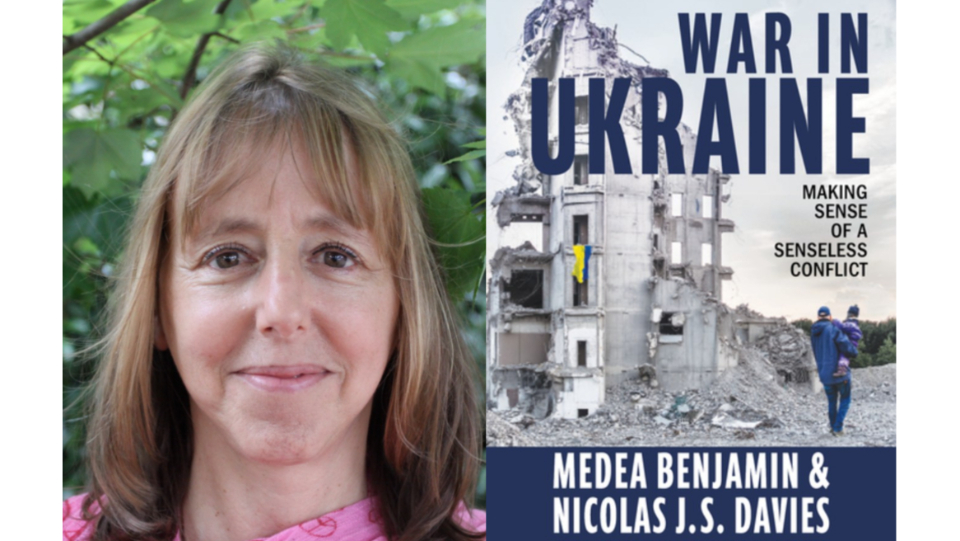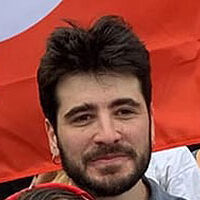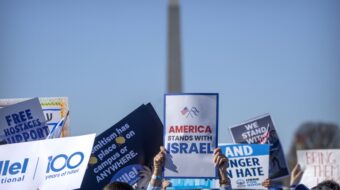
On Dec. 18, 2022, Medea Benjamin, co-founder of the feminist anti-war organization CODEPINK, met with People’s World to discuss her and Nicolas Davies’ new book War in Ukraine: Making Sense of a Senseless Conflict. She spoke about the essential need to connect various struggles for the cause of peace and to look toward building a popular anti-war movement in the U.S.
Jacob Buckner: How did the project for War in Ukraine: Making Sense of a Senseless Conflict begin? What was the hope of depicting your views of this devastating war, which differed from the mainstream narrative of U.S. funds being increased to simply defend Ukrainian sovereignty?
Medea Benjamin: My colleague Nicolas Davies and I had been writing about Ukraine prior to the Russian invasion. We knew the background on NATO expansion and the U.S. involvement around the 2014 uprising, but we did not predict the Russian invasion.
So, after Russia invaded, we put our heads together to try and understand why this happened—why the proposal that Russia put out in December 2021was summarily dismissed by the West as a point of discussion. We felt like once the war started, the narrative in the mainstream media would be devoid of context.
We’ve seen and both written about past wars and understand that once a war starts, it becomes a propaganda war and a black-and-white scenario. We thought it was important to quickly put out a book that laid out the context for the war—a book that condemned the invasion but put it in the scenario of U.S.-NATO provocations and refusals to deal politically with this explosive issue before it blew up into a full-on war. 
You just finished a 2022 book tour for this publication. What has the response been? Have you found that the reception has opened up a missing dialogue about the war?
Every event has been different depending on the place and the audience. The war certainly continues to be a very contentious issue. What I’ve found is that people are hungry for discussion, and they often leave with a new perspective.
But most important to me is that we’ve been talking to groups about organizing to make the call for a ceasefire and negotiations more visible. Some of the trips include rallies, visits to offices of congresspeople, visits to editorial boards of newspapers, and more actions to generate discussion.
I’ve also found that the book sales are incredible. We haven’t gotten any mainstream acknowledgment, not even trashing us, but the sales are very good. I think it’s because people are buying it for their friends and relatives to help reinforce their own arguments that they’ve been having.
Also, we did an 18-minute video that is being used a lot on college campuses; people are doing house parties and showing it at churches.
You also mentioned that the book is bringing together many different groups. One initiative you mentioned was the National Council of Elders, with a campaign to get leaders in the faith-based community to come out for a “Christmas truce.” How did this campaign start, and why is it important to have the support of these groups?
I was hosted by a group called the Wisconsin Interfaith Task Force. They wrote a one-sentence statement that we added more background to discussing the Christmas Truce that happened in 1914 during World War I.
We talked about it with the Fellowship of Reconciliation ,and then the National Council of Elders came after that, so it was an initiative with CODEPINK and Fellowship of Reconciliation. We thought that it was important to bring the war into a moral perspective, saying that the obligation of people who care about the common good should be to end the war, not fuel the war.
We originally thought that getting 100 faith-based leaders would be a great accomplishment. Now we have over 1,000. We’re going to keep moving ahead, getting more faith leaders to sign on to a call for a ceasefire negotiations, getting them to lobby the White House.
A number of them have been in the White House, have access to people in the White House, and have participated in the prayer breakfast there, so they’re asking for meetings with different agencies in the White House to bring the petition and talk about the war.
We’re excited about that, but we need similar initiatives that reach out to other constituencies, like environmentalists, the labor movement, women’s organizations, and youth groups.
Right, and ultimately these issues are connected. How can there be no money for community resources, yet there are endless budget increases for war? And with that, how can we begin to build a genuine mass anti-war movement in the U.S.?
We have to be visible, so there must be rallies. There are demonstrations called for New York City and other places on January 14th. There should be rallies outside the offices of congresspeople that are voting for more and more money for this war. There should be people in public places with signs saying, “Let’s talk about Ukraine,” and engaging people with conversations.
There should be resolutions brought to organizations to get them to sign on, making them take a stand on this issue. There should be campaigns pushing the mainstream media to provide alternative viewpoints.
So, all of this is part of building awareness and visibility and putting pressure on the people that can make the decisions about U.S. policy. I’m excited that there are now calls for mobilization, weeks of action. Women-led groups like us in CODEPINK are trying to mobilize for International Women’s Day on March 8th and build with our colleagues in Europe, including in Russia, to build up the international opposition to this war. 
What other initiatives is CODEPINK looking to in 2023 for building this movement locally and nationally?
Working on the link between environmentalism or environmental destruction and the war in Ukraine. I think there are such deep connections: whether its war itself as such a destructive force to the environment, the possibilities of nuclear war, the possibilities of explosions at the nuclear plants in Ukraine, and the issue of where we spend our money.
I think we have a lot of opportunities to build connections, not only to push groups nationally to take a stand, but also locally. For example, I was just in San Diego for a book talk, and they had a number of the environmental groups tabling before the talk and giving out literature connecting these issues.
A lot of the discussion of the talk ended up being about the environmental connections and what we could do to get that community more engaged. In the environmental community, so many young people are involved, so many people of color…that is such an important focus of our outreach for next year.
Highlighting the shared interests of these different groups and fighting collectively.
Yes, doing actions together and visiting congressional offices together. Also, from the ground up, getting these big environmental groups to take a stand: to write letters, to do op eds. There’s a lot to be done when we do that outreach and when we make those connections.
There’s the way this war is fueling militarism all around the world. It’s sucking up money not just from us at home, but now it’s the European countries spending so much more of their national treasure on weapons. It’s going to be very hard for them to keep their social safety net, their national healthcare systems, and their free college education.
They will become more and more like us in the United States, where we are putting almost a trillion dollars into militarism every year.
This war has not only affected the Ukrainian people and caused so much death and suffering, but we have to keep attention on how it is taking all of us in the wrong direction in terms of where we put our resources.
This war is affecting poor people around the world. The level of hunger has increased tremendously because of the increasing price of grains coming from Ukraine and Russia, and the level of inflation from the disruption of the energy markets because of the sanctions on Russia.
So, the people who are hurt most by this, aside from the Ukrainians and Russians and Russian and Ukrainian soldiers, are the working class and poor people around the world.

MOST POPULAR TODAY


Communist Karol Cariola elected president of Chile’s legislature

Zionist organizations leading campaign to stop ceasefire resolutions in D.C. area

Afghanistan’s socialist years: The promising future killed off by U.S. imperialism

High Court essentially bans demonstrations, freedom of assembly in Deep South






Comments